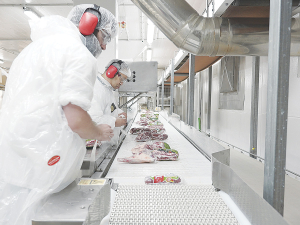NZ Red Meat Outlook 2026: Growth amid trade uncertainty
While things are looking positive for the red meat sector in 2026, volatility in global trade remains a concern, says the Meat Industry Association (MIA).
 The meat sector wants the new government to streamline the siloed approach to regulatory making by government departments.
The meat sector wants the new government to streamline the siloed approach to regulatory making by government departments.
A top priority for the incoming National-led coalition government is to sort out the ways regulations are formulated by various government agencies.
That's the view of the Meat Industry Association chief executive Sirma Karapeeva, who says there is a lack of a coordinated approach to deal with issues.
She told Rural News there seems to be a lack of consultation between government departments, which means that policy settings are disjointed and sometimes at odds with each other. Karapeeva believes this is just one of the systemic issues that causes grief to meat processors.
"The new government needs to have a good look at this issue and rationalise the silo approach to regulatory making."
Karapeeva's comments come as government departments - along with industry groups - are preparing briefing papers for the incoming government, known as BIMS, or briefings to the incoming minister.
These papers are compulsory for government departments, but other lobby organisations also take the opportunity to brief ministers and to state the issues they believe the government needs to address.
Karapeeva says the MIA will be seeking clarification around environmental matters such as He Waka Eke Noa (HWEN) and how the new government proposes to take this matter forward. She says farmers need certainty and practical, cost-effective solutions.
She adds that a big issue for the meat sector is around immigration matters. MIA has been raising concerns about this for a long time and Karapeeva says some of the same problems complained about are still not sorted.
"Some companies trying to apply to get in overseas workers but are finding the processing of visas is taking months. These delays make it impossible for companies to plan their season when they don't know how many people they will have working for them."
Another immigration-related issue of concern to MIA is having a 'fit for purpose' seasonal workers scheme - similar to the RSE arrangement that is available to the horticulture sector. Karapeeva says the meat industry was offered a scheme similar to the RSE before the election by the outgoing government.
"But the terms and conditions around that scheme do not fit the model of our industry," she says.
"I sense they did a cut and paste job with the horticulture RSE scheme and applied it to us. However, the hort RSE scheme only runs for seven months, but our processing industry runs for 12 months and what was offered simply does not meet the needs of our industry."
Karapeeva wants the incoming government to review what was offered and have a scheme tailored for the specific needs of the red meat sector.
Pāmu has welcomed ten new apprentices into its 2026 intake, marking the second year of a scheme designed to equip the next generation of farmers with the skills, knowledge, and experience needed for a thriving career in agriculture.
One team with 43 head, including a contingent from Mid Canterbury, are reflecting on a stellar NZ DairyEvent.
Fonterra farmer shareholders have approved the mechanism for a $2/share capital return expected from the sale of its global consumer and associated businesses.
Trainees in the horticulture industry studying towards a certificate or diploma can now apply for Horticulture New Zealand's (HortNZ) 2026 Industry Training Scholarships programme.
OPINION: The first three Global Dairy Trade (GDT) auctions have been a morale booster for farmers.
Former Fonterra executive Alex Turnbull has been appointed CEO to lead all five Yili Oceania Business Division companies in New Zealand.